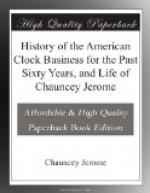In the fall of 1811, I made a bargain with the man that I was bound to, that if he would give me four months in the winter of each year when the business was dull, I would clothe myself. I therefore went to Waterbury, and hired myself to Lewis Stebbins, (a singing master of that place,) to work at making the dials for the old fashioned long clock. This kind of business gave me great satisfaction, for I always had a desire to work at clocks. In 1807, when I was fourteen years old, I proposed to my guardian to get me a place with Mr. Eli Terry, of Plymouth, to work at them. Mr. Terry was at that time making more clocks than any other man in the country, about two hundred in a year, which was thought to be a great number.
My guardian, a good old man, told me that there was so many clocks then making, that the country would soon be filled with them, and the business would be good for nothing in two or three years. This opinion of that wise man made me feel very sad. I well remember, when I was about twelve years old, what I heard some old gentleman say, at a training, (all of the good folks in those days were as sure to go to training as to attend church,) they were talking about Mr. Terry; the foolish man they said, had begun to make two hundred clocks; one said, he never would live long enough to finish them; another remarked, that if he did he never would, nor could possibly sell so many, and ridiculed the very idea.
I was a little fellow, but heard and swallowed every word those wise men said, but I did not relish it at all, for I meant some day to make clocks myself, if I lived.
What would those good old men have thought when they were laughing at and ridiculing Mr. Terry, if they had known that the little urchin who was so eagerly listening to their conversation would live to make Two Hundred Thousand metal clocks in one year, and many millions in his life. They have probably been dead for years, that little boy is now an old man, and during his life has seen these great changes. The clock business has grown to be one of the largest in the country, and almost every kind of American manufactures have improved in much the same ratio, and I cannot now believe that there will ever be in the same space of future time so many improvements and inventions as those of the past half century—one of the most important in the history of the world. Everyday things with us now would have appeared to our forefathers as incredible. But returning to my story—having got myself tolerably well posted about clocks at Waterbury, I hired myself to two men to go into the state of New Jersey, to make the old fashioned seven foot standing clock-case. Messrs. Hotchkiss and Pierpont, of Plymouth, had been selling that kind of a clock without the cases, in the northern part of that State, for about twenty dollars, apiece. The purchasers, had complained to them however, that there was no one in that region that could make the case for them, which prevented




